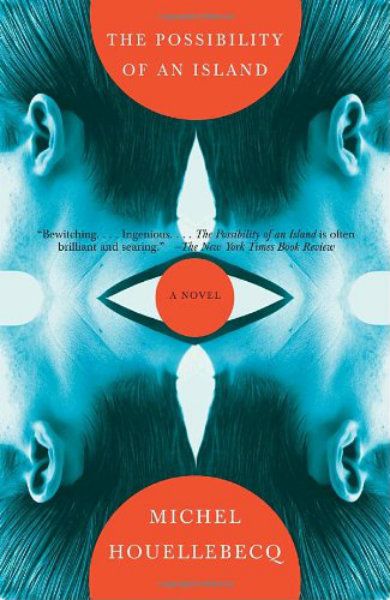
Just finished reading Possibility of an Island by Michel Houellebecq. Loved it. I've read his Elementary Particles some time ago. It really repulsed me at the time. Now I think his observations in human behavior, however painful they are, are very truthful. I just wanted to share with you guys about what the main character says about Haneke. I thought it was funny and biting:
*Just to give you a little bit of background info. The main character Daniel in the book, has made career out of being the most cynical, racist, sexist, any number of negative -ist comic persona. He realizes, at this juncture of the book, that he is aging and there is no turning back (he is in his 50s). Even though he is banging a 22 yr old girlfriend, Esther, who gives him the greatest physical pleasure he ever experienced in life, he gradually learns that the young generation doesn't seem to be aware of the concept of 'love' or 'compassion'.
Daniel is in many ways a despicable character. What I like about Houellebecq is that once in a while, asserts certain truth he believes in through his protagonist and doesn't try to hide it. And I tend to agree with him.
I had decided at that particular time to remain in Madrid all week, and two days later I had a little argument with Esther on the subject of Ken Park, the latest film by Larry Clark, which she had been keen to go and see. I had hated Kids, and I hated Ken Park even more, the scene where this dirty little shit beats up his grandparents was particularly unbearable. That filmmaker completely disgusted me, and it was no doubt this sincere disgust that made me incapable of stopping myself from talking about it, while I strongly suspected that Esther liked him out of habit and conformism, because it was generally cool to approve of the representation of violence in the arts, and that she liked him without any real discernment, in the same way she liked, for example, Michael Haneke, without even realizing that the meaning of those sorrowful and moral films by Michael Haneke was completely different from that of those by Larry Clark. I knew that it would have been better for me to keep quiet, that abandoning my usual comic character could only bring me trouble, but I couldn't, the imp of the perverse was the stronger. We were in a bizarre, very kitsch bar, with mirrors and gold fixtures, full of paroxysmal homosexuals who buggered themselves silly in adjacent backrooms, yet which was open to everyone, with groups of young boys and girls calmly drinking Coca-Colas at neighboring tables. I explained to her while rapidly downing my iced tequila that I had built the whole of my career and fortune on the commercial exploitation of bad instincts, of the West's absurd attraction to assert that among all the merchants of evil, Larry Clark was one of the most common, most vulgar, simply because he unreservedly took the side of the young against the old, because all his films were an incitement to children to treat their parents without the least humanity, the least pity, and that there was nothing new or original about this, it had been the same in all the cultural sectors for the last fifty-odd years, and this supposedly cultural tendency in fact only hid the desire for a return to a primitive state where the young got rid of the old without ceremony, with no questions asked, simply because they were too weak to defend themselves. It was, therefore, just a brutal for any civilization could judge itself on the fate it reserved for the weakest, for those who were no longer either productive or desirable, in short Larry Clark and his abject accomplice Harmony Korine were just two of the most tedious-and artistically the most miserable- examples of the Nietzschean scum who had been proliferating in the cultural field for far too long, and who could in no way be put on the same level as people like Michael Haneke, or like me, for example- who had always made sure to introduce a certain element of doubt, uncertainty, and unease into my shows, even if they were (I was the first to admit it) otherwise repugnant.
*Just to give you a little bit of background info. The main character Daniel in the book, has made career out of being the most cynical, racist, sexist, any number of negative -ist comic persona. He realizes, at this juncture of the book, that he is aging and there is no turning back (he is in his 50s). Even though he is banging a 22 yr old girlfriend, Esther, who gives him the greatest physical pleasure he ever experienced in life, he gradually learns that the young generation doesn't seem to be aware of the concept of 'love' or 'compassion'.
Daniel is in many ways a despicable character. What I like about Houellebecq is that once in a while, asserts certain truth he believes in through his protagonist and doesn't try to hide it. And I tend to agree with him.
1 comment:
I've been wanting to read Houellecq but I'm not sure I'm ready to drink his bitter tea quite yet
Post a Comment